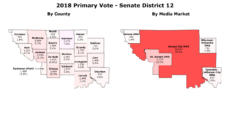JEFFERSON CITY, Mo. — Missouri is ranked No. 32 in broadband access compared to the rest of the country, according to Tim Arbeiter, director of broadband development at the Department of Economic Development.
Arbeiter said there are more than 147,000 unserved or underserved households and more than 392,000 individuals without reliable internet access in the state. The state has made drastic improvements despite the high numbers, substantially increasing its ranking since 2018.
“This is actually up nine spots, so we’re making progress in the right direction,” Arbeiter said. “Is it where we want to be? No. There’s a lot of work to be done in this space as it relates to access.”
Arbeiter presented data on Missouri’s broadband access, ongoing projects, and planned efforts before the House Interim Committee on Broadband Development Thursday. He noted the state ranked in the bottom five for low-cost internet access, with 23 percent of Missouri students lacking reliable internet access; his department is partnering with the Department of Elementary and Secondary Education (DESE) to improve internet access for students and schools.
More than $824 million has been invested in broadband projects across the state from the USDA, the Federal Communications Commission (FCC), and other partners, he said. The projects are in various stages of development, with additional proposals awaiting FCC approval.
In terms of the state’s contribution, more than $22 million in CARES Act funds went to enhancing internet access; of those reimbursements, $4 million went toward distributing internet hotspots to 38 health clinics, while $8 million went to colleges for distance learning and another $2.4 million connected more than 2,500 homes. The State Broadband Access Program also funded access for nearly 7,000 homes.
The seven-member interim committee was approved by House Speaker Rob Vescovo to convene during the interim with Rep. Louis Riggs at the helm. Riggs pointed to the transition to virtual learning, work, and health care at the height of the pandemic as one of the catalysts for the new committee.
“The recent pandemic demonstrated that high-speed broadband internet can no longer be considered a luxury; it has become a necessity far too many Missourians have done and continue to do without,” Riggs said. “This committee was appointed to study where we are as a state in 2021, where we need to be, and what steps we need to take as policymakers and appropriators to ensure that broadband internet is readily available to every Missourian who wants it.”
Riggs has listed internet access as a priority of his tenure in the lower chamber; he previously told The Missouri Times he would “keep running until broadband is universal in rural Missouri.”
The group will focus on four basic areas: business applications, online education, precision agriculture, and telemedicine. It will also look at things other states have implemented when it comes to broadband access, Riggs said.
Other members include Reps. Bishop Davidson, Travis Fitzwater, Jay Mosley, Wes Rogers, Travis Smith, and Sara Walsh.
The committee will convene monthly throughout the interim; Riggs said the committee would file a report on its findings in December.

Cameron Gerber studied journalism at Lincoln University. Prior to Lincoln, he earned an associate’s degree from State Fair Community College. Cameron is a native of Eldon, Missouri.
Contact Cameron at cameron@themissouritimes.com.






























